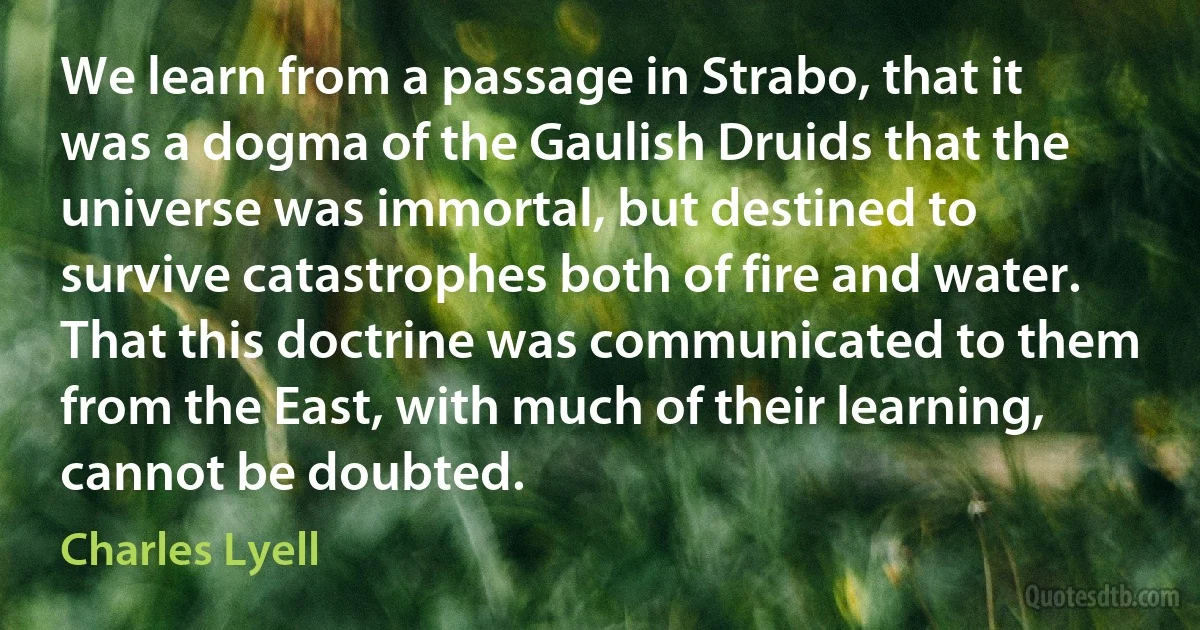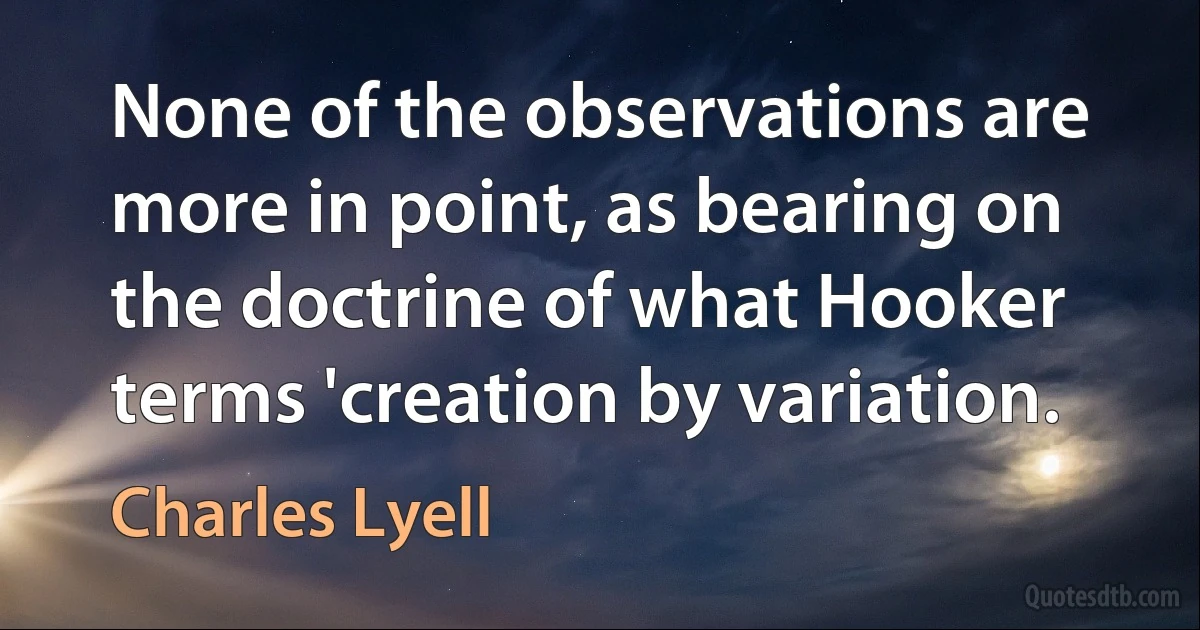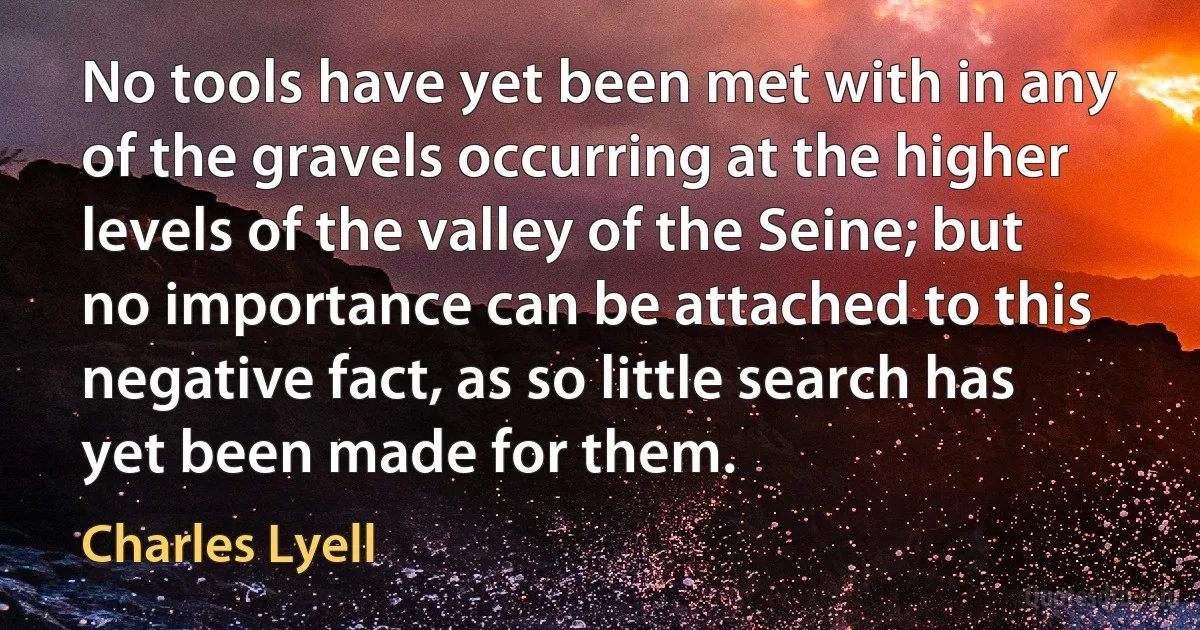Charles Lyell quotes - page 3
The Posthumous Works of Robert Hooke M. D.,'... appeared in 1705, containing 'A Discourse of Earthquakes'... His treatise... is the most philosophical production of that age, in regard to the causes of former changes in the organic and inorganic kingdoms of nature. 'However trivial a thing,' he says, 'a rotten shell may appear to some, yet these monuments of nature are more certain tokens of antiquity than coins or medals, since the best of those may be counterfeited or made by art and design, as may also books, manuscripts, and inscriptions, as all the learned are now sufficiently satisfied has often been actually practised,' &c.; 'and though it must be granted that it is very difficult to read them and to raise a chronology out of them, and to state the intervals of the time wherein such or such catastrophes and mutations have happened, yet it is not impossible.

Charles Lyell
The earliest doctrines of the Indian and Egyptian schools of philosophy agreed in ascribing the first creation of the world to an omnipotent and infinite Being. They concurred also in representing this Being, who had existed from all eternity, as having repeatedly destroyed and reproduced the world and all its inhabitants. ...We have no right to refer to mere chance the prevailing notion that the earth and its inhabitants had formerly undergone a succession of revolutions and catastrophes, interrupted by long intervals of tranquility.

Charles Lyell
So long as physiologists continued to believe that man had not existed on the earth above six thousand years, they might, with good reason, withhold their assent from the doctrine of a unity of origin of so many distinct races; but the difficulty becomes less and less, exactly in proportion as we enlarge our ideas of the lapse of time during which different communities may have spread slowly, and become isolated, each exposed for ages to a peculiar set of conditions, whether of temperature, or food, or danger, or ways of living.

Charles Lyell
Fabio Colonna deserves to be distinguished; for, although he gave way to the dogma that all fossil remains were to be referred to the Noachian deluge, he resisted the absurd theory of Stelluti, who taught that fossil wood and ammonites were mere clay, altered into such forms by sulfurous waters and subterranean heat; and he pointed out the different states of shells buried in the strata, distinguishing between, first, the mere mould or impression; secondly, the cast or nucleus; and thirdly, the remains of the shell itself. He had also the merit of being the first to point out, that some of the fossils had belonged to marine, and some to terrestrial testacea.

Charles Lyell
A geologist should be well versed in chemistry, natural philosophy, mineralogy, zoology, comparative anatomy, botany; in short, in every science relating to organic and inorganic nature. ...But the brief duration of human life, and our limited powers, are so far from permitting us to aspire to such extensive acquisitions, that excellence even in one department is within the reach of few, and those individuals most effectually promote the general progress, who concentrate their thoughts on a limited portion of the field of inquiry.

Charles Lyell
Cesalpino, a celebrated botanist, conceived that fossil shells had been left on the land by the sea, and had concreted into stone during the consolidation the soil; and in the following year (1597), Simeone Majoli went still farther, and coinciding for the most part with views of Cesalpino, suggested that the shells and matter of the Veronese, and other districts, might have cast up, upon the land, by volcanic explosions, like those gave rise, in 1538, to Monte Nuovo, near Puzzuoli.- This hint was the first imperfect attempt to connect the position fossil shells with the agency of volcanoes, a system more fully developed by Hooke, [Antonio] Lazzaro Moro, Hutton, and other writers. Two years afterwards, Imperati advocated the animal origin of fossilized shells, yet admitted that stones could vegetate by force of 'an internal principle,' and, as evidence of this, he referred to the teeth of fish, and spines of echini found petrified.

Charles Lyell
It was objected to Hooke, that his doctrine of the extinction of species derogated from the wisdom and power of the Omnipotent Creator; but he answered, that as individuals die, there may be some termination to the duration of a species; and his opinions, he declared, were not repugnant to Holy Writ: for the Scriptures taught that our system was degenerating, and tending to its final dissolution; 'and as, when that shall happen, all the species will be lost, why not some at one time and some at another?'

Charles Lyell
As breeders of domestic animals, when they choose certain varieties in preference to others to breed from, speak technically of their method as that of 'selecting,' Mr. Darwin calls the combination of natural causes, which may enable certain varieties of wild animals or plants to prevail over others of the same species, 'natural selection.'

Charles Lyell
The anonymous author of 'The Vestiges of Creation' published in 1844 a treatise, written in a clear and attractive style, which made the English public familiar with the leading views of Lamarck on transmutation and progression but brought no new facts or original line of argument to support those views, or to combat the principal objections which the scientific world entertained against them. No decided step in this direction was made until the publication in 1858 of two papers, one by Mr. Darwin and another by Mr. Wallace.

Charles Lyell
To many, this doctrine of Natural Selection, or 'the preservation of favoured races in the struggle for life,' seems so simple, when once clearly stated, and so consonant with known facts and received principles, that they have difficulty in conceiving how it can constitute a great step in the progress of science.

Charles Lyell
As Hooke declared the favorite hypothesis of the day ('that marine fossil bodies were to be referred to Noah's flood') to be wholly untenable, he appears to have felt himself called upon to substitute a diluvial theory of his own, and thus he became involved in countless difficulties and contradictions. ...When ...he.

Charles Lyell
Turtles, he adds, and such large ammonites as are found in Portland, seem to have been the productions of the seas of hotter countries, and it is necessary to suppose that England once lay under the sea within the torrid zone! To explain this and similar phenomena, he indulges in a variety of speculations concerning changes in the position of the axis of the earth's rotation, a shifting of the earth's center of gravity, 'analogous to the revolutions of the magnetic pole,' &c. None of these conjectures, however, are proposed dogmatically, but rather in the hope of promoting fresh inquiries and experiments.

Charles Lyell
We learn particularly from the Timaeus of Plato, that the Egyptians believed the world to be subject to occasional conflagrations and deluges, whereby the gods arrested the career of human wickedness, and purified the earth from guilt. After each regeneration, mankind were in a state of virtue and happiness, from which they gradually degenerated again into vice and immorality.

Charles Lyell



